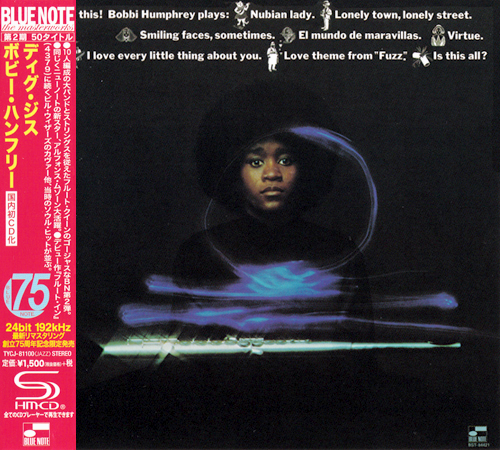Dig This, recorded and released in 1972, is the second of Bobbi Humphrey's seven Blue Note albums; it is also her sophomore recording. The album was produced by then-label president George Butler. He had signed Humphrey and helmed her debut, Flute In, the previous year. Recorded at A&R Studios, the young flutist was teamed with bassists Ron Carter and Wilbur Bascomb, Jr., powerhouse drummer Alphonse Mouzon, guitarists David Spinozza and William Fontaine, and keyboardists Harry Whitaker and Paul Griffin. While the album’s formula didn’t deviate that much from her debut -- an easy, tasty balance of soul, pop, and jazz tunes -- the material, production, and Humphrey’s confidence all stand out here. Check her reading of Bill Withers' “Lonely Town, Lonely Street,” as she stretches the melody to meet Bascomb's and Spinozza’s funky grooves. While strings swoop and hover, threatening to overtake the mix, her plaintive style goes right at them with meaty, in-the-pocket phrasing. Her version of Whitfield and Strong’s “Smiling Faces Sometimes” is well-known in pop culture for the sample that appeared on Common’s “Puppy Chow,” but taking the tune in full, Humphrey’s gift as a soloist is revealed in full, as she winds around and through funky clavinets, Rhodes, strings, guitars, and Mouzon’s popping snare. The reading of Stevie Wonder's “I Love Every Little Thing About You,” with its bubbling basslines and Humphrey’s understatement of the melody, make this a bright, shining jazz-funk number. “El Mundo de Maravillas (A World of Beauty),” is one of two fine Mouzon compositions to appear here, this one commences with a cello in a spacy, soulful ballad that showcases Humphrey’s classical chops before it moves into funk terrain and then back again. The set closer is a souled-out reading of Kenny Barron's “Nubian Lady,” with chunky guitars, Bascomb’s Fender bass, shuffling drums, and Humphrey adding air and space to the knotty groove. While Dig This is not the revelation that Blacks and Blues is (it appeared two years later), it is nonetheless a stone killer example of jazz-funk in its prime, and should be considered an essential part of the canon.
-> This comment is posted on Allmusic by Thom Jurek, follower of our blog 'O Púbis da Rosa' <-Tracklist :
1. Lonely Town, Lonely Street 4:35
(Bill Withers)
2. Is This All? 3:43
(Henry Johnson)
3. Smiling Faces Sometimes 6:19

(Barrett Strong-Norman Whitfield)
4. Virtue 4:28
(Alphonse Mouzon)
5. I Love Every Little Thing About You 4:19
(Stevie Wonder)
6. Love Theme from "Fuzz" 3:47
(Dave Grusin)
7. Eo Mundo de Maravillas (A World of Beauty) 7:31
(Alphonse Mouzon)
8. Nubian Lady 4:47
(Kenny Barron)
Credits :
Bobbi Humphrey - Flute
George Marge - Oboe, English Horn
Seymour Berman, Paul Gershman, Irving Spice, Paul Winter - Violin
Julian Barber (Viola), Seymour Barab (Cello), Eugene Bianco (Harp)
Harry Whitaker (Electric Piano), Paul Griffin (Electric Piano, Clavinet)
William Fontaine, David Spinozza - Guitar
Ron Carter - Bass
Wilbur Bascomb Jr. - Electric Bass
Alphonse Mouzon - Drums, Bell Tree, Arranger
Warren Smith (Percussion)
Wade Marcus, Horace Ott - Arranger











.jpg)







